- Home
- Edith Wharton
The Custom of the Country Page 2
The Custom of the Country Read online
Page 2
This solacing thought enabled Mrs Spragg to yield herself unreservedly to Mrs Heeny’s ministrations, which were prolonged for a happy confidential hour; and she had just bidden the masseuse good-bye, and was restoring the rings to her fingers, when the door opened to admit her husband.
Mr Spragg came in silently, setting his high hat down on the centre-table, and laying his overcoat across one of the gilt chairs. He was tallish, grey-bearded and somewhat stooping, with the slack figure of the sedentary man who would be stout if he were not dyspeptic; and his cautious grey eyes with pouch-like underlids had straight black brows like his daughter’s. His thin hair was worn a little too long over his coat collar, and a Masonic emblem dangled from the heavy gold chain which crossed his crumpled black waistcoat.
He stood still in the middle of the room, casting a slow pioneering glance about its gilded void; then he said gently: ‘Well, mother?’
Mrs Spragg remained seated, but her eyes dwelt on him affectionately.
‘Undine’s been asked out to a dinner-party; and Mrs Heeny says it’s to one of the first families. It’s the sister of one of the gentlemen that Mabel Lipscomb introduced her to last night.’
There was a mild triumph in her tone, for it was owing to her insistence and Undine’s that Mr Spragg had been induced to give up the house they had bought in West End Avenue, and move with his family to the Stentorian. Undine had early decided that they could not hope to get on while they ‘kept house’ – all the fashionable people she knew either boarded or lived in hotels. Mrs Spragg was easily induced to take the same view, but Mr Spragg had resisted, being at the moment unable either to sell his house or to let it as advantageously as he had hoped. After the move was made it seemed for a time as though he had been right, and the first social steps would be as difficult to make in a hotel as in one’s own house; and Mrs Spragg was therefore eager to have him know that Undine really owed her first invitation to a meeting under the roof of the Stentorian.
‘You see we were right to come here, Abner,’ she added, and he absently rejoined: ‘I guess you two always manage to be right.’
But his face remained unsmiling, and instead of seating himself and lighting his cigar, as he usually did before dinner, he took two or three aimless turns about the room, and then paused in front of his wife.
‘What’s the matter – anything wrong down town?’ she asked, her eyes reflecting his anxiety.
Mrs Spragg’s knowledge of what went on ‘down town’ was of the most elementary kind, but her husband’s face was the barometer in which she had long been accustomed to read the leave to go on unrestrictedly, or the warning to pause and abstain till the coming storm should be weathered.
He shook his head. ‘N-no. Nothing worse than what I can see to, if you and Undine will go steady for a while.’ He paused and looked across the room at his daughter’s door. ‘Where is she – out?’
‘I guess she’s in her room, going over her dresses with that French maid. I don’t know as she’s got anything fit to wear to that dinner,’ Mrs Spragg added in a tentative murmur.
Mr Spragg smiled at last. ‘Well – I guess she will have,’ he said prophetically.
He glanced again at his daughter’s door, as if to make sure of its being shut; then, standing close before his wife, he lowered his voice to say: ‘I saw Elmer Moffatt down town today.’
‘Oh, Abner!’ A wave of almost physical apprehension passed over Mrs Spragg. Her jewelled hands trembled in her black brocade lap, and the pulpy curves of her face collapsed as if it were a pricked balloon.
‘Oh, Abner,’ she moaned again, her eyes also on her daughter’s door.
Mr Spragg’s black eyebrows gathered in an angry frown, but it was evident that his anger was not against his wife.
‘What’s the good of Oh Abnering? Elmer Moffatt’s nothing to us – no more’n if we never laid eyes on him.’
‘No – I know it; but what’s he doing here? Did you speak to him?’ she faltered.
He slipped his thumbs into his waistcoat pockets. ‘No – I guess Elmer and I are pretty well talked out.’
Mrs Spragg took up her moan. ‘Don’t you tell her you saw him, Abner.’
‘I’ll do as you say; but she may meet him herself’.
‘Oh, I guess not – not in this new set she’s going with! Don’t tell her anyhow.’
He turned away, feeling for one of the cigars which he always carried loose in his pocket; and his wife, rising, stole after him, and laid her hand on his arm.
‘He can’t do anything to her, can he?’
‘Do anything to her?’ He swung about furiously. ‘I’d like to see him touch her – that’s all!’
II
UNDINE’S white and gold bedroom, with sea-green panels and old-rose carpet, looked along Seventy-second Street toward the leafless tree-tops of the Central Park.
She went to the window, and drawing back its many layers of lace gazed eastward down the long brown-stone perspective. Beyond the Park lay Fifth Avenue – and Fifth Avenue was where she wanted to be!
She turned back into the room, and going to her writing-table laid Mrs Fairford’s note before her, and began to study it minutely. She had read in the Boudoir Chat of one of the Sunday papers that the smartest women were using the new pigeon-blood notepaper with white ink; and rather against her mother’s advice she had ordered a large supply, with her monogram in silver. It was a disappointment, therefore, to find that Mrs Fairford wrote on the old-fashioned white sheet, without even a monogram – simply her address and telephone number. It gave Undine rather a poor opinion of Mrs Fairford’s social standing, and for a moment she thought with considerable satisfaction of answering the note on her pigeon-blood paper. Then she remembered Mrs Heeny’s emphatic commendation of Mrs Fairford, and her pen wavered. What if white paper were really newer than pigeon-blood? It might be more stylish, anyhow. Well, she didn’t care if Mrs Fairford didn’t like red paper – she did! And she wasn’t going to truckle to any woman who lived in a small house down beyond Park Avenue …
Undine was fiercely independent and yet passionately imitative. She wanted to surprise every one by her dash and originality, but she could not help modelling herself on the last person she met, and the confusion of ideals thus produced caused her much perturbation when she had to choose between two courses. She hesitated a moment longer, and then took from the drawer a plain sheet with the hotel address.
It was amusing to write the note in her mother’s name – she giggled as she formed the phrase ‘I shall be happy to permit my daughter to take dinner with you’ (‘take dinner’ seemed more elegant than Mrs Fairford’s ‘dine’) – but when she came to the signature she was met by a new difficulty. Mrs Fairford had signed herself ‘Laura Fairford’ – just as one schoolgirl would write to another. But could this be a proper model for Mrs Spragg? Undine could not tolerate the thought of her mother’s abasing herself to a denizen of regions beyond Park Avenue, and she resolutely formed the signature: ‘Sincerely, Mrs Abner E. Spragg.’ Then uncertainty overcame her, and she rewrote her note and copied Mrs Fairford’s formula: ‘Yours sincerely, Leota B. Spragg.’ But this struck her as an odd juxtaposition of formality and freedom, and she made a third attempt: ‘Yours with love, Leota B. Spragg.’ This, however, seemed excessive, as the ladies had never met; and after several other experiments she finally decided on a compromise, and ended the note: ‘Yours sincerely, Mrs Leota B. Spragg.’ That might be conventional, Undine reflected, but it was certainly correct.
This point settled, she flung open her door, calling imperiously down the passage: ‘Céleste!’ and adding, as the French maid appeared: ‘I want to look over all my dinner-dresses.’
Considering the extent of Miss Spragg’s wardrobe her dinner-dresses were not many. She had ordered a number the year before but, vexed at her lack of use for them, had tossed them over impatiently to the maid. Since then, indeed, she and Mrs Spragg had succumbed to the abstract pleasure of buying two or thre
e more, simply because they were too exquisite and Undine looked too lovely in them; but she had grown tired of these also – tired of seeing them hang unworn in her wardrobe, like so many derisive points of interrogation. And now, as Céleste spread them out on the bed, they seemed disgustingly commonplace, and as familiar as if she had danced them to shreds. Nevertheless, she yielded to the maid’s persuasions and tried them on.
The first and second did not gain by prolonged inspection: they looked old-fashioned already. ‘It’s something about the sleeves,’ Undine grumbled as she threw them aside.
The third was certainly the prettiest; but then it was the one she had worn at the hotel dance the night before, and the impossibility of wearing it again within the week was too obvious for discussion. Yet she enjoyed looking at herself in it, for it reminded her of her sparkling passages with Claud Walsingham Popple, and her quieter but more fruitful talk with his little friend – the young man she had hardly noticed.
‘You can go, Céleste – I’ll take off the dress myself,’ she said: and when Céleste had passed out, laden with discarded finery, Undine bolted her door, dragged the tall pier-glass forward and, rummaging in a drawer for fan and gloves, swept to a seat before the mirror with the air of a lady arriving at an evening party. Céleste, before leaving, had drawn down the blinds and turned on the electric light, and the white and gold room, with its blazing wall-brackets, formed a sufficiently brilliant background to carry out the illusion. So untempered a glare would have been destructive to all half-tones and subtleties of modelling; but Undine’s beauty was as vivid, and almost as crude, as the brightness suffusing it. Her black brows, her reddish-tawny hair and the pure red and white of her complexion defied the searching decomposing radiance: she might have been some fabled creature whose home was in a beam of light.
Undine, as a child, had taken but a lukewarm interest in the diversions of her playmates. Even in the early days when she had lived with her parents in a ragged outskirt of Apex, and hung on the fence with Indiana Frusk, the freckled daughter of the plumber ‘across the way’, she had cared little for dolls or skipping-ropes, and still less for the riotous games in which the loud Indiana played Atalanta to all the boyhood of the quarter. Already Undine’s chief delight was to ‘dress up’ in her mother’s Sunday skirt and ‘play lady’ before the wardrobe mirror. The taste had outlasted childhood, and she still practised the same secret pantomime, gliding in, settling her skirts, swaying her fan, moving her lips in soundless talk and laughter; but lately she had shrunk from everything that reminded her of her baffled social yearnings. Now, however, she could yield without afterthought to the joy of dramatizing her beauty. Within a few days she would be enacting the scene she was now mimicking; and it amused her to see in advance just what impression she would produce on Mrs Fairford’s guests.
For a while she carried on her chat with an imaginary circle of admirers, twisting this way and that, fanning, fidgeting, twitching at her draperies, as she did in real life when people were noticing her. Her incessant movements were not the result of shyness: she thought it the correct thing to be animated in society, and noise and restlessness were her only notion of vivacity. She therefore watched herself approvingly, admiring the light on her hair, the flash of teeth between her smiling lips, the pure shadows of her throat and shoulders as she passed from one attitude to another. Only one fact disturbed her: there was a hint of too much fullness in the curves of her neck and in the spring of her hips. She was tall enough to carry off a little extra weight, but excessive slimness was the fashion, and she shuddered at the thought that she might some day deviate from the perpendicular.
Presently she ceased to twist and sparkle at her image, and sinking into her chair gave herself up to retrospection. She was vexed, in looking back, to think how little notice she had taken of young Marvell, who turned out to be so much less negligible than his brilliant friend. She remembered thinking him rather shy, less accustomed to society; and though in his quiet deprecating way he had said one or two droll things he lacked Mr Popple’s masterly manner, his domineering yet caressing address. When Mr Popple had fixed his black eyes on Undine, and murmured something ‘artistic’ about the colour of her hair, she had thrilled to the depths of her being. Even now it seemed incredible that he should not turn out to be more distinguished than young Marvell: he seemed so much more in the key of the world she read about in the Sunday papers – the dazzling auriferous world of the Van Degens, the Driscolls and their peers.
She was roused by the sound in the hall of her mother’s last words to Mrs Heeny. Undine waited till their adieux were over: then, opening her door, she seized the astonished masseuse and dragged her into the room.
Mrs Heeny gazed in admiration at the luminous apparition in whose hold she found herself.
‘Mercy, Undine – you do look stunning! Are you trying on your dress for Mrs Fairford’s?’
‘Yes – no – this is only an old thing.’ The girl’s eyes glittered under their black brows. ‘Mrs Heeny, you’ve got to tell me the truth – are they as swell as you said?’
‘Who? The Fairfords and Marvells? If they ain’t swell enough for you, Undine Spragg, you’d better go right over to the court of England!’
Undine straightened herself. ‘I want the best. Are they as swell as the Driscolls and Van Degens?’
Mrs Heeny sounded a scornful laugh. ‘Look here, now, you unbelieving girl! As sure as I’m standing here before you, I’ve seen Mrs Harmon B. Driscoll of Fifth Avenue laying in her pink velvet bed with Honiton lace sheets on it, and crying her eyes out because she couldn’t get asked to one of Mrs Paul Marvell’s musicals. She’d never ‘a dreamt of being asked to a dinner there! Not all of her money couldn’t ‘a bought her that – and she knows it!’
Undine stood for a moment with bright cheeks and parted lips; then she flung her soft arms about the masseuse.
‘Oh, Mrs Heeny – you’re lovely to me!’ she breathed, her lips on Mrs Heeny’s rusty veil; while the latter, freeing herself with a good-natured laugh, said as she turned away: ‘Go steady, Undine, and you’ll get anywheres.’
Go steady, Undine! Yes, that was the advice she needed. Sometimes, in her dark moods, she blamed her parents for not having given it to her. She was so young … and they had told her so little! As she looked back she shuddered at some of her escapes. Even since they had come to New York she had been on the verge of one or two perilous adventures, and there had been a moment during their first winter when she had actually engaged herself to the handsome Austrian riding-master who accompanied her in the Park. He had carelessly shown her a card-case with a coronet, and had confided in her that he had been forced to resign from a crack cavalry regiment for fighting a duel about a Countess; and as a result of these confidences she had pledged herself to him, and bestowed on him her pink pearl ring in exchange for one of twisted silver, which he said the Countess had given him on her deathbed with the request that he should never take it off till he met a woman more beautiful than herself.
Soon afterward, luckily, Undine had run across Mabel Lipscomb, whom she had known at a middle western boarding-school as Mabel Blitch. Miss Blitch occupied a position of distinction as the only New York girl at the school, and for a time there had been sharp rivalry for her favour between Undine and Indiana Frusk, whose parents had somehow contrived – for one term – to obtain her admission to the same establishment. In spite of Indiana’s unscrupulous methods, and of a certain violent way she had of capturing attention, the victory remained with Undine, whom Mabel pronounced more refined; and the discomfited Indiana, denouncing her schoolmates as a ‘bunch of mushes’, had disappeared forever from the scene of her defeat.
Since then Mabel had returned to New York and married a stock-broker; and Undine’s first steps in social enlightenment dated from the day when she had met Mrs Harry Lipscomb, and been again taken under her wing.
Harry Lipscomb had insisted on investigating the riding-master’s record, and had found that
his real name was Aaronson, and that he had left Cracow under a charge of swindling servant-girls out of their savings; in the light of which discoveries Undine noticed for the first time that his lips were too red and that his hair was pomaded. That was one of the episodes that sickened her as she looked back, and made her resolve once more to trust less to her impulses – especially in the matter of giving away rings. In the interval, however, she felt she had learned a good deal, especially since, by Mabel Lipscomb’s advice, the Spraggs had moved to the Stentorian, where that lady was herself established.
There was nothing of the monopolist about Mabel, and she lost no time in making Undine free of the Stentorian group and its affiliated branches: a society addicted to ‘days’, and linked together by membership in countless clubs, mundane, cultural or ‘earnest’. Mabel took Undine to the days, and introduced her as a ‘guest’ to the club-meetings, where she was supported by the presence of many other guests – ‘my friend Miss Stager, of Phalanx, Georgia’, or (if the lady were literary) simply ‘my friend Ora Prance Chettle of Nebraska – you know what Mrs Chettle stands for’.
Some of these reunions took place in the lofty hotels moored like a sonorously named fleet of battleships along the upper reaches of the West Side: the Olympian, the Incandescent, the Ormolu; while others, perhaps the more exclusive, were held in the equally lofty but more romantically styled apartment-houses: the Parthenon, the Tintern Abbey or the Lido. Undine’s preference was for the worldly parties, at which games were played, and she returned home laden with prizes in Dutch silver; but she was duly impressed by the debating clubs, where ladies of local distinction addressed the company from an improvised platform, or the members argued on subjects of such imperishable interest as: ‘What is Charm?’ or ‘The Problem-Novel’ – after which pink lemonade and rainbow sandwiches were consumed amid heated discussion of the ‘ethical aspect’ of the question.

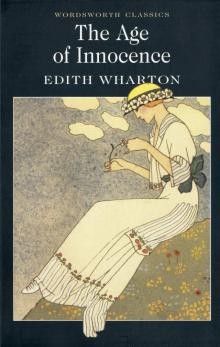 The Age of Innocence
The Age of Innocence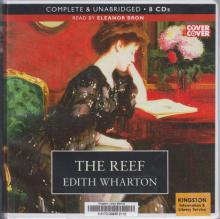 The Reef
The Reef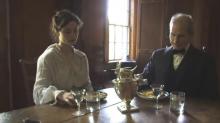 Summer
Summer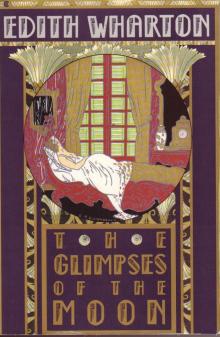 The Glimpses of the Moon
The Glimpses of the Moon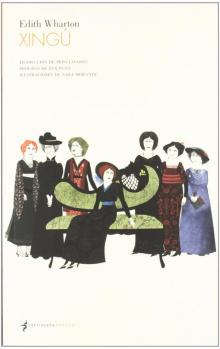 Xingu
Xingu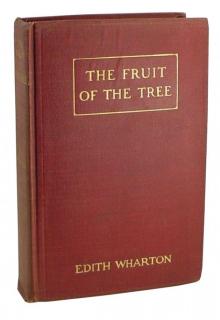 The Fruit of the Tree
The Fruit of the Tree Fast and Loose
Fast and Loose Artemis to Actaeon and Other Verse
Artemis to Actaeon and Other Verse The Line of Least Resistance
The Line of Least Resistance The Lamp of Psyche
The Lamp of Psyche The Reckoning
The Reckoning Afterward
Afterward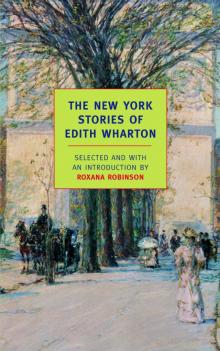 The New York Stories of Edith Wharton
The New York Stories of Edith Wharton The 2014 Halloween Horrors Megapack
The 2014 Halloween Horrors Megapack 'Copy': A Dialogue
'Copy': A Dialogue The Recovery
The Recovery The Fulness of Life
The Fulness of Life Early Short Stories Vol. 1
Early Short Stories Vol. 1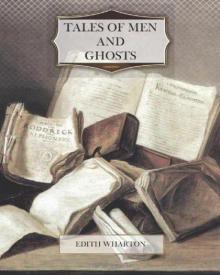 Tales of Men and Ghosts
Tales of Men and Ghosts The House of the Dead Hand
The House of the Dead Hand That Good May Come
That Good May Come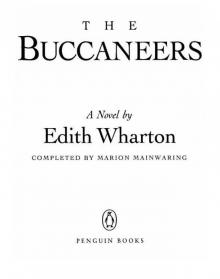 The Buccaneers
The Buccaneers Other Times, Other Manners
Other Times, Other Manners The Hermit and the Wild Woman
The Hermit and the Wild Woman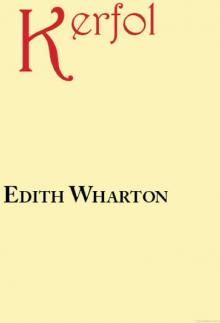 Kerfol
Kerfol The Duchess at Prayer
The Duchess at Prayer Bunner Sisters
Bunner Sisters The Choice
The Choice Madame De Treymes
Madame De Treymes Ethan Frome, Summer, Bunner Sisters
Ethan Frome, Summer, Bunner Sisters In Morocco
In Morocco The Valley of Decision
The Valley of Decision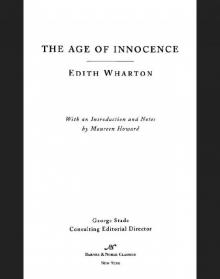 Age of Innocence (Barnes & Noble Classics Series)
Age of Innocence (Barnes & Noble Classics Series) The Angel at the Grave
The Angel at the Grave April Showers
April Showers Sanctuary
Sanctuary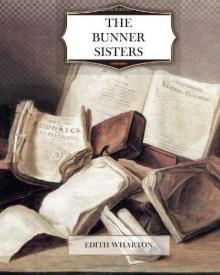 The Bunner Sisters
The Bunner Sisters Mrs. Manstey's View
Mrs. Manstey's View Writing a War Story
Writing a War Story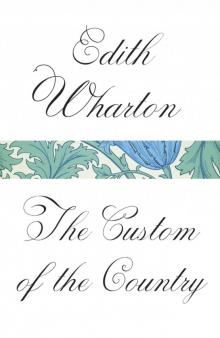 The Custom of the Country
The Custom of the Country In Trust
In Trust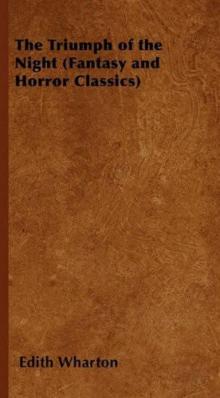 The Triumph of the Night
The Triumph of the Night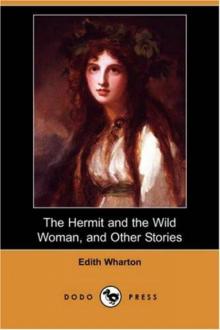 The Hermit and the Wild Woman, and Other Stories
The Hermit and the Wild Woman, and Other Stories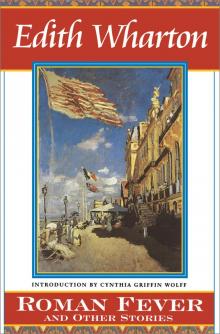 Roman Fever and Other Stories
Roman Fever and Other Stories The Mission of Jane
The Mission of Jane The Descent of Man and Other Stories
The Descent of Man and Other Stories Coming Home
Coming Home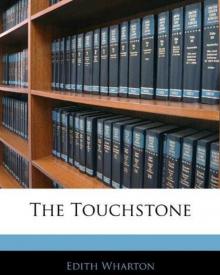 The Touchstone
The Touchstone Early Short Stories Vol. 2
Early Short Stories Vol. 2 Edith Wharton's Verse, 1879-1919, from various journals.
Edith Wharton's Verse, 1879-1919, from various journals.